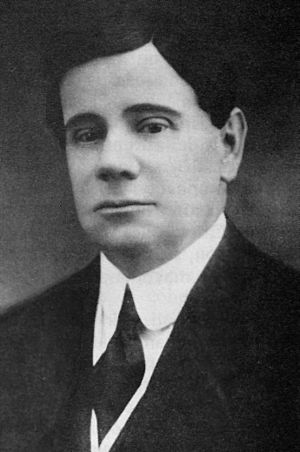Federico Tinoco Granados facts for kids
Quick facts for kids
Gen. Federico Tinoco
|
|
|---|---|
 |
|
| 21st President of Costa Rica | |
| In office 27 January 1917 – 12 August 1919 |
|
| Preceded by | Alfredo González |
| Succeeded by | Juan Bautista Quirós |
| Personal details | |
| Born |
José Federico Alberto de Jesús Tinoco Granados
21 November 1868 San José, Costa Rica |
| Died | 7 September 1931 (aged 62) Paris, France |
| Political party | Peliquista Party |
General José Federico Alberto de Jesús Tinoco Granados was a leader of Costa Rica from 1917 to 1919. He was born on November 21, 1868, and passed away on September 7, 1931. During his time in power, he led a government that had complete control, often called a dictatorship.
Contents
Who Was Federico Tinoco?
Federico Tinoco was a military general in Costa Rica. He served in the army for many years. Later, he became the Minister of War. This job meant he was in charge of the country's military forces. He worked in the government of President Alfredo González.
How He Came to Power
On January 27, 1917, Federico Tinoco and his brother, José Joaquín, took control of the government. This was done through a coup d'état. A coup is when a group suddenly takes power, usually by force, instead of through an election. After this, they set up a military dictatorship. This meant that Federico Tinoco had all the power and tried to stop anyone who disagreed with him.
Leading Costa Rica
Many wealthy people in Costa Rica supported Tinoco's government. This was because he changed some strict money rules that President González had put in place. In May 1918, his government also declared war on the German Empire. This happened during World War I. However, the United States did not support Tinoco. The U.S. President, Woodrow Wilson, still supported the previous government.
The End of His Rule
People in Costa Rica began to strongly oppose Tinoco's rule. This started around June 1919. Things got worse quickly. His brother, José Joaquín, was sadly killed in early August. Soon after, on August 13, Federico Tinoco decided to step down. He gave up his power to Juan Bautista Quirós. After resigning, Tinoco left Costa Rica and went to live in Europe. He died in Paris, France, in 1931.
Costa Rica and World Events
Because there was a disagreement about whether Tinoco's government was truly in charge, Costa Rica did not sign the Treaty of Versailles. This treaty officially ended World War I. So, the war between Costa Rica and Germany technically continued for a long time. It only officially ended after World War II. This happened when Costa Rica was included in the Potsdam Agreement. Costa Rica did not declare war on Germany during World War II.
See also
 In Spanish: Federico Alberto Tinoco Granados para niños
In Spanish: Federico Alberto Tinoco Granados para niños
 | May Edward Chinn |
 | Rebecca Cole |
 | Alexa Canady |
 | Dorothy Lavinia Brown |

